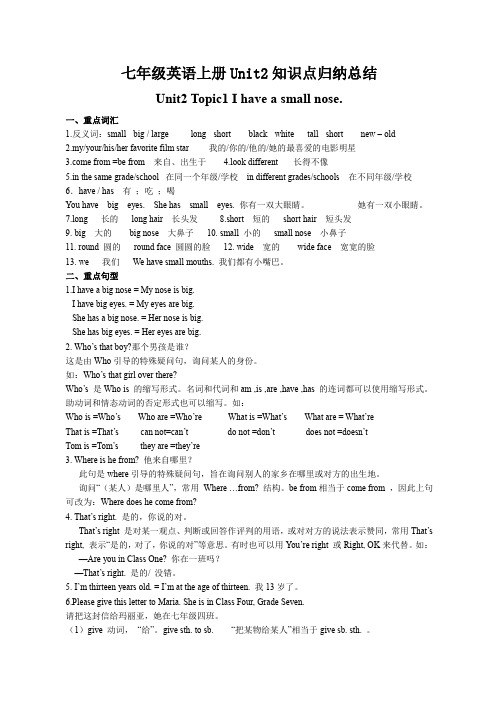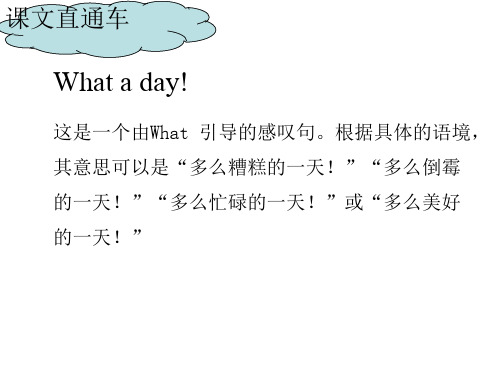unit2-知识点讲解
Unit2单词知识点讲义人教版英语八年级上册

2023年人教版初中英语八年级上册Unit 2单词知识点讲解(讲义)1 houseworkn.【u】家务事;家务劳动do the houseworkHousework is a never-ending task.She always helps with the housework.2 hardlyadv.几乎不,几乎没有There is hardly any tea in the bottle.We hardly know each other.用于can或者could后表示很难I can hardly keep my eyes open.我都快睁不开眼了。
同义词seldom几乎不3 everadv.从来;任何时候(否定句,疑问句和if引导的句子)Nothing ever happens here.这儿几乎没发生过任何事。
adv.总是;曾经It was raining harder than ever.当下下着前所未有的大雨。
4 hardly ever表示频率非常低,几乎不会发生I hardly ever go to concerts.I hardly ever eat fish.She hardly ever exercises.5 onceadv.一次;仅一次I’ve only been there once.我只去过那里一次。
She cleans his car once a week.她一个周洗一次车。
adv.曾经I once met your mother.The book was once famous, but nobody reads it today.conj. 一旦The water is fine once you’re in.你一旦下了水,就觉得水里很舒服。
at once 立刻;马上once again再一次once more 又一次;再一次once upon a time 从前;很久以前6 twiceadv.两次They go there twice a month.adv.两倍Cats sleeps twice as much as people.猫睡觉的时间比人长一倍。
Unit2-how-often-do-you-exercise知识点讲解和练习

Unit2 how often do you exercise一、同步知识梳理重点单词1.家务事2.几乎不3.曾经4.一次5.两次6.因特网7. 节目8.满的)9.秋千 10.大概 11.最小12.咖啡13.健康 14.结果 15.百分之..16.在线17.电视节目 18.即使 19.穿过20.头脑21.身体 22.这样的 23.在一起24.死亡25.作家 26.牙科医生 27.杂志28.然而29.比 30.几乎 31.毫无32.较小 33.得分?重点词组1.2.几乎不 2.摇摆舞3.至少4.垃圾食品5.例如6.多于7.少于重点句型1.What do you usually do on weekends;I always exercise.2.What does she do on weekendsShe sometimes goes shopping.3.How often do you you go to the moviesI go to movies maybe once a month.Section Aoften do you exercise 你多久做一次运动—【解析1】how often/ how long / how far/ how soon辨析》【解析2】exercise v 锻炼=do sports= play sports【短语】take /have/do exercise 做运动 do morning exercise 做早操 do eye exercise 做眼保健操2.3.What do you usually do on weekends 你在周末做什么【解析1】频度副词【注】:频度副词表示多长时间做某事一次, 用在实义动词之前,系动词、助动词、情态动词之后。
We often clean the classroom every day. 【拓展】some time /sometime/some times/sometimes 【口诀】:分开是一段,合起是某时; 分开s 是倍次,合起s 是某时 (1)some time 一段时间,做时间状语 ;It takes sb. some time to do sth. 做某事花费某人多长时间(2)(3)sometime adv. 在某个时候,I hope to visit the USA _____ in the future.A. sometimesB. some timesC. sometime D . some time(3) some times 名词词组,“几次,几倍” sometimes=at times 有时 (一般现在时的标志词) 【解析2】weekend/weekday 辨析 【解析】on weekends = on Saturday and Sunday 在周末on weekdays= from Monday to Friday 在工作日3. Hardly ever 几乎从不【解析】hard (1)adv 努力地,猛烈地work hard 努力工作study hard 努力学习:(2) adj. 困难的,艰难的=difficult◆It’s hard/difficult for sb. to do sth. 做某事对某人来说是困难的It’s hard for us ____________(finish) the work without other ’s help.【拓展】hardly adv “几乎不,从来不”,表否定意义,常与can ,any ,ever 连用。
七年级上册英语Unit 2知识点梳理

七年级上册英语Unit 2知识点梳理七年级上册英语Unit 2知识点梳理Unit 2 Is this your pencil ?一、 be 有三个形式:am is are 。
am 是be单第一人称单数形式; is 是be 的第三人称单数形式;are 是be的复数形式; be 是am is are 的原型。
be 的形式与主语的连用:am--------------- I (第一人称单数主语)heshe itthis tha单数名词is----------------- 不可数名词 (第三人称单数主语)动词不定式动名词we you theyare -------------- these those (复数主语)复数名词二、 Excuse me . 可以灵活翻译成“劳驾、打扰了”。
当要“与陌生人搭话”或者“将要做的事会打扰别人”时,使用该语言。
三、含be的肯定句变否定句和一般疑问句的方法以及一般疑问句的回答方法。
含be的肯定句变否定句be + not (is not isnt are not arent )变一般疑问句be提到主语前(am are I you my your)一般疑问句的简略回答用Yes或No回答。
借用一般疑问句的第一个词,且主语用主格人称代词。
练习题 (一)、把下列含be的肯定句先变成否定句,再变成一般疑问句,然后做一般疑问句。
肯定句否定句一般疑问句肯定回答否定回答1、肯定句 This is my pencil . (这是我的铅笔)否定句 This ______my pencil . (这不是我的铅笔)一般疑问句 ______ this______ pencil ? (这是你的铅笔吗)肯定回答 ____________. 否定回答. _____________2、肯定句 That is my eraser .(那是我的橡皮擦)否定句 That ______eraser . (那不是我的橡皮擦)一般疑问句 ______ that ______eraser ? (那是你的橡皮擦)肯定回答 ____________ 否定回答 ______________3、肯定句 These are my pens . (这些是我的钢笔)否定句 These______ my pens . (这些不是我的钢笔)一般疑问句 ______ these ______pens ? (这些是你的钢笔吗)肯定回答 ____________. 否定回答 ____________ .4、肯定句 Those are his baseballs . (那些是他的棒球)否定句 Those ______his baseballs . (那些不是他的棒球)一般疑问句 ______those ______ pens ? (那些是他的棒球吗)肯定回答 ____________ 否定回答 ____________5 、肯定句 I am Helen (我是海伦)否定句 ______ ______Helen . (我不是海伦)一般疑问句 ______ ______Helen . (你是海伦吗)肯定回答 ____________. 否定回答 ____________ .6 、肯定句 It is her notebook . (它是她的笔记本)否定句 It ______her notebook . (它不是她的笔记本)一般疑问句 ______ ______ her notebook ? (它是她的笔记本吗)肯定回答 ____________. 否定回答 ____________ .7、肯定句 A lot of keys are in the pencil—case .(许多钥匙在铅笔合里)否定句 A lot of keys ______in the pencil—case .(许多钥匙不在铅笔盒里)一般疑问句 ______a lot of keys in the pencil—case ? (许多钥匙在铅笔盒里吗?)肯定回答 ____________. 否定回答 ____________ .(二)、补全对话Jim: ______ ______ , Tom . Is this your dictionary ?Tom: Yes,______ ______Jim : Whats this ?Tom: Its _______ eraser .Jim : How do you ______ it ?Tom : E—R—A—S—E—R本快词汇:they他们 these这些 those 那些pencil 铅笔 isnt 不是 arent不是dictionary 词典 baseball棒球 noteball笔记本key钥匙ring 打电话 call 打电话ruler尺子 pen钢笔 pencil—case铅笔盒eraser橡皮擦 a lot of许多every day每天 Excuse me 劳驾打扰了。
Unit2知识点讲解人教版英语七年级下册

1.英语钟点时刻的表达在英语中,钟点时刻的表达除了用阿拉伯数字(如8:10,12:45)外,还可以用以下几种表达方式。
◆当时间是整点时,可用“钟点数+o'clock”来表达,其中o'clock可以省略。
如:6:00 → six (o'clock) 11:00 → eleven (o'clock)◆当时间不是整点时,表达方式有以下两种:1. 钟点数+分钟数。
如:9:08 → nine eight 14:40 → fourteen forty2. 分钟数+ past / to +钟点数1) 当分钟数小于30时,用“分钟数+ past +钟点数”表示“几点过几分”。
如:8:09 → nine past eight7:25 → twentyfive past seven2) 当分钟数大于30时,用“(60-分钟数) + to +下一个钟点数”表示“差几分到几点”。
如:11:40 → twenty to twelve 2:58 → two to three注意:在分钟数中,15分钟还可以用a quarter表示,30分钟还可以用half来表示。
如:11:15 → a quarter past eleven8:45 → a quarter to nine13:30 → half past thirteen◆ A.M.(a.m.)和P.M.(p.m.)在12小时制中,我们可以用A.M.(a.m.)和P.M.(p.m.)来区分上、下半天。
A.M.(a.m.)意为“午前、上午”; P.M.(p.m.)意为“午后、下午”。
如:早上六点半→ 6:30 a.m. / half past six in the morning中午十二点→ 12:00 p.m. / 12 o'clock in the daytime午夜十二点→ 12:00 a.m. / 12 o'clock at night / at midnight【运用】用两种方式写出下列时间的英语表达1. 2. 3.___________________ 或___________________ ___________________或______________________________________或___________________参考答案1. four thirty; half past four2. eleven five; five past eleven3. nine fifteen; a quarter past nine2. what time & when 引导的特殊疑问句what time和when均可对时间状语进行提问,用来询问什么时间。
七年级上册英语Unit2知识点归纳总结

七年级英语上册Unit2知识点归纳总结Unit2 Topic1 I have a small nose.一、重点词汇1.反义词:small - big / large long - short black - white tall - short new – old2.my/your/his/her favorite film star我的/你的/他的/她的最喜爱的电影明星e from =be from来自、出生于4.look different长得不像5.in the same grade/school在同一个年级/学校in different grades/schools在不同年级/学校6.have / has 有;吃;喝You have big eyes. She has small eyes. 你有一双大眼睛。
她有一双小眼睛。
7.long 长的long hair 长头发8.short 短的short hair 短头发9. big 大的big nose 大鼻子10. small 小的small nose 小鼻子11. round 圆的round face 圆圆的脸12. wide 宽的wide face 宽宽的脸13. we 我们We have small mouths. 我们都有小嘴巴。
二、重点句型1.I have a big nose = My nose is big.I have big eyes. = My eyes are big.She has a big nose. = Her nose is big.She has big eyes. = Her eyes are big.2. Who’s that boy?那个男孩是谁?这是由Who引导的特殊疑问句,询问某人的身份。
如:Who’s that girl over there?Who’s 是Who is 的缩写形式。
名词和代词和am ,is ,are ,have ,has 的连词都可以使用缩写形式。
新版人教英语7年级上Unit 2 We're Family 单元知识点梳理(背诵版+讲解版)

Unit 2 We’re Family 单元知识点梳理(背诵版+讲解版)Unit 2 We’re Family序号词汇音标词性词义页码1mean/ miːn /v.意思是;打算P.27 2husband/ ˈhʌzbənd /n.丈夫P.28 3bat/ bæt /n.球棒;球拍P.29 4ping-pong bat乒乓球拍P.29 5play ping-pong打乒乓球P.29 6every day每天P.29 7together/ təˈɡeðə(r) /adv.一起;共同P.29 8fishing rod钓竿P.29 9spend/ spend /v.花(时间,钱等)P.29 10 a lot of大量;许多P.29 11really/ ˈriːəli /adv.非常;确实;真正地P.29 12activity/ ækˈtɪvəti /n.活动P.30 13chess/ tʃes /n.国际象棋P.31 14Chinese chess中国象棋P.31 15funny/ ˈfʌni /adj.好笑的;奇怪的P.3116laugh/ lɑːf /v.n.笑;发笑笑声P.3117different/ ˈdɪfrənt /adj.不同的P.31 18violin/ ˌvaɪəˈlɪn /n.小提琴P.31 19have fun玩得高兴P.31 20pink/ pɪŋk /adj.&n.粉红色(的)P.32 21hat/ hæt /n.帽子P.32 22handsome/ ˈhænsəm /adj.英俊的P.32 23knee/ niː /n.膝;膝盖P.32 24at night在夜晚P.32 25in the middle中间;中部P.32 26grandchild/ ˈɡræntʃaɪld /n.(pl.grandchildren/ˈgrænˈtʃɪldrən /)(外)孙子;(外)孙女P.3227son/ sʌn /n.儿子P.33 28next to紧邻;在....近旁P.3329hike/ haɪk /v.&n.远足;徒步旅行P.3330go hiking远足;徒步旅行P.33 31David/ ˈdeɪvɪd /戴维P.28 32Jim/ dʒɪm /吉姆P.28 33Kate/ keɪt /凯特P.31 34Lily/ ˈlɪli /莉莉P.32 35Ireland/ ˈaɪələnd /爱尔兰P.32 36Fred/ fred /弗雷德P.32 37Sam/ sæm /萨姆P.32 38Jane/ dʒeɪn /简P.32 39Jack/ dʒæk /杰克P.32 40Sarah/ ˈseərə /萨拉P.32 41Oscar/ ˈɒskə(r) /奥斯卡P.32 42Lucy/ ˈluːsi /露西P.321. mean (v. 意思是)(名词,意思)meaning (形容词,有意义的)meaningful2. spend (v. 花费) (过去式)— spent3. really (adv. 真正地) (形容词)real4. activity (n.活动) (复数)activities5. different (adj. 不同的) (名词)— difference6. grandchild (n. 复数) (名词)— grandchildrenSection A 短语Section B 短语对某人意味着……mean to sb多少人how many people家庭成员family member一个……的照片 a photo of……的意义the meaning of...粉色的帽子pink hat……的关系the relationship of...打网球play tennis奶奶的丈夫grandmother’shusband在他的膝盖上on his knee重读音节stressed syllables在右边on the right乒乓球拍ping-pong bat给某人读故事read sb a story一起打乒乓球play ping-pongtogether在晚上at night每周every week在中间in the middle钓鱼竿fishing rod和某人说某事say to sb花费时间做某事spend time doing sth同样的事情the same thing弹钢琴弹得好play the piano well家庭照片family photo很多 a lot of开心做某事be happy to do sth 班主任class teacher帮助彼此help each other拉二胡play the erhu……中的每一个each of...阅读很多read a lot制作自己的家庭树make your own family tree喜爱园艺like gardening命名不同的家庭成员name different family members宠物狗pet dog关键词key word一个搞笑的男孩 a funny boy徒步go hiking使某人做某事make sb do sth紧挨着next to嘲笑某人laugh at sb表达自己的爱express my love 与……不同be different from一个安静的女孩 a quiet girl在一起过得开心have a lot of funtogether一.中元音&后元音中元音后元音二.音节&重读规则(一)音节划分1. 单音节单词中只包含一个音节,即一个发音的元音,或者一个元音字母组合。
Unit2-What-a-day知识点详解知识讲解

bring和take的区别 bring :把某物带来某地 bring …to… (从远处带到近处) take :把某物带去某地 take… to …( 从近处带到远处)
bread是不可数名词,我们常说a piece of bread (一片面包)或some bread。
日期的表示方法:1)the + 日子(序数词)+ of + 月份 2)月份+ the + 日子(序数词)
在7月5日: on the fifth of July/ July the fifth 在3月18日:on the eighteenth of March
March the eighteenth (在具体日期前,用“on”)
/eə/ bear pear wear
卡通直通车
Sam meets Bobby in the park. meet sb.遇到某人,见到某人
meet动词,后面人称代词用宾格, 如:meet me/you/him/her/them met(meet的过去式)
You look sad.
• look sad看起来很难过 • (look看起来,为系动词,后跟形容词)
课文直通车
What a day!
这是一个由What 引导的感叹句。根据具体的语境, 其意思可以是“多么糟糕的一天!”“多么倒霉 的一天!”“多么忙碌的一天!”或“多么美好 的一天!”
• 20th September (读法: the twentieth of September ) September 20th ( 读法:September the twentieth )
It’s time for bed.= It’s time to go to bed. It’s time for some drinks. = It’s time to have some drinks.
Unit2 How often do you exercise 知识点总结

Unit2 How often do you exercise? 知识点总结一、单词和短语1.How often......? 多久一次?How often 常对every day,always,usually,often,sometimes,hardly ever,never,once a week,twice 等表示频度副词或短语进行提问。
2.help v./n. 帮助A.作动词,相关短语:①.help sb. with sth. 在某方面帮助某人②. help sb. (to) do sth. 帮助某人做某事③. help oneself to sth. 请自便④.can’t help doing sth. 情不自禁做某事Eg. My brother helps me with my English. = My brother helps me learn English.我的弟弟帮我学习英语。
He can’t help crying when watching the love movie. 他看这个爱情电影时情不自禁哭了。
Please help yourself to the drinks. 请自取饮料酒水。
3.4.5.频度副词频率排序:always>almost always>usually>often>sometimes>seldom>hardly ever>almost never>never6.once 副词,一次;曾经;一旦A.作副词,意为“一次”,表示频率,常用来回答how often的提问。
Eg. —How often do you go shopping? —Once a week.B.作副词,意为“曾经”,表时间,常与一般过去时连用。
Eg. He once lived in Beijing,China. 他曾经住在中国北京。
- 1、下载文档前请自行甄别文档内容的完整性,平台不提供额外的编辑、内容补充、找答案等附加服务。
- 2、"仅部分预览"的文档,不可在线预览部分如存在完整性等问题,可反馈申请退款(可完整预览的文档不适用该条件!)。
- 3、如文档侵犯您的权益,请联系客服反馈,我们会尽快为您处理(人工客服工作时间:9:00-18:30)。
Unit 2 Heroes课堂考点清障考点1When the spaceship was doing its seventh circle, Yang Liwei showed the flags of China and the United Nations, expressing the wishes of the Chinese people to explore and use space peacefully. (Page 23)The scientists in the world have been exploring the Antarctic regions.世界科学家一直在考察南极地区。
用法归纳explore vt. 探测;勘探explore vi. 探索;探测;探究;探险exploration n. 探索对应训练(1)They explored every means, but it was all in vain.(英译汉)_______________________________________(2) ________________ (我们必须探讨)all the possibilitiesfor the solution of the problem.(3)There are still places in the Amazon jungle _______________________ (没有被人探索过的).(4)With this equipment, ____________________________(你就能去冒险探索一个新世界)of adventure andunderwater beauty!考点2 Sun Yat-sen led the 1911 revolution and founded the first republic of China. (Page 24)The school was founded ten years ago.这所学校是十年前创办的。
They have set up a blind school.他们建了一所盲人学校。
用法归纳found vt. 建立;创立set up 设立;建立set off 出发set out 出发set out to do sth. 立志做某事对应训练(1)The company, ____________________ (成立于1985年),has twenty years of history.(2)The company has ______ (设立)a new branch in Wales.(3)After she qualified as doctor, she _______ (开业) inpractice in Yorkshire.(4)She _______ (立志)to become Britain’s first womanPrime Minister.考点3 In my opinion, Dr Sun Yat-sen is very important. (Page 24)In my opinion, many teenagers depend too much on their parents.以我的观点看,很多青少年现在太依赖父母了。
用法归纳in my opinion 在我看来in one’s opinion 按照……的看法form an ill opinion of 对……不好的评价have a high opinion of 有很高的评价对应训练(1) ____________ (以我的观点看),it is a good habit towash our hands before a meal.(2) _________________ (在专家看来),most cloned animalssuffer from several birth defects or die.(3)我认为你犯了一个严重的错误。
(汉译英;mistake)_______________________________________考点4 He organised a march to Washington in 1963.(Page 25)The soldiers marched along the highway.部队沿公路而行。
用法归纳march vi.& n. 游行示威;行军march vt. 拖走,迫使到(某处)对应训练(1)The troops _______________ (穿越了)the jungle.(2)Every day,we ___________________ (行进二十英里)withease.(3) They reached the camp after a _______________ (三天行军).(4)For seven days and nights,his soldiers _______________(横过了)the bridges across.考点5 He has always been very strict with his daughters, training them hard to compete against each other. (Page 26)About 800 athletes competed in fifteen events.大约有800名运动员参加了15个项目的竞赛。
用法归纳compete vi. 比赛;竞争compete against/in/with 竞争;竞赛compete for 为……而竞争competition n. 比赛;竞赛composition n. 写作,作文对应训练(1)Five children __________ (赛跑)in the race.(2)The young tennis player has often ________________(对抗赛)famous players, but so far, he has always been beaten.(3)几位学生竞争奖学金。
(汉译英;scholarship)_______________________________________考点6At first, he couldn’t breathe without a machine, but he learnt to breathe on his own. (Page 28)I’ve been living on my own for four years now.我独自生活至今已经4年了。
用法归纳on one’s own独立地one’s own; of one’s own某人自己的own vt. 拥有by oneself 独自;靠自己对应训练(1)Travelling __________ (独自去),I can decide when to starton my way.(2)Although her father is in the firm, she got the job___________ (凭她自己的力量).(3)许多老年人独立生活。
(写作小练笔:主谓+介词;older people)_______________________________________(4)Use your _________ (自己的钢笔).I need mine.考点7 He also raised a lot of money to promote medical research into back injuries. (Page 28)He worked hard and was soon promoted.他工作努力,很快就获得提升。
用法归纳promote vt. 促进;提升promote vt. 宣传,推销(商品)promote vt. 支持;鼓励对应训练(1)Our teacher has been __________ (提升)to headmaster.(2)Be patient, you _______________ (将获得提升)in thecourse of time.(3)Do you have any idea how to __________ (推销)the salesof this product?(4)我们应该促进世界和平。
(汉译英;world peace)_______________________________________考点8The doctor said I was not going to pull through. (Page 28)His injuries are severe, but he’s expected to pull through.他的伤势很重,但有希望康复。
用法归纳pull through 使从(受伤)中活下来;渡过难关pull up 吊起;(使)停下pull down 拆毁;摧毁;推翻pull in (火车)进站;到站;停站对应训练(1)The expert medical treatment _________________(使他恢复了健康).(2)No matter what happens, we’ll _____________(度过难关)together.(3)He had real problems, but the teacher pulled him through.(替换) __________(4)Thanks to his strong body, Jack was able to __________his recent serious illness.A. pull downB. pull throughC. pull up D .pull in考点9 Since that moment,I have never thought of giving up! (Page 28)Don’t give up and don’t give in.不要放弃,不要屈服。
用法归纳give up 放弃give in 投降;屈服;让步give in to sb./sth. 向某人屈服;上交give off 发出(蒸气);发散(光线)give out 用尽;精疲力竭give away 泄露对应训练(1)We _______________ (一定不能让步)to threats.(2)When shall I __________ (上交)my paper?(3) ______________ (别就此放弃)now; you’re improvingall the time.(4)Her wife tried to force her husband to ______ smoking,but he didn’t __________ to her, continuing to smoke asusual. (give in, give up)考点10 Of course, I’ve had moments of feeling sorry for myself, but I’ve n ever had any thoughts of committing suicide. (Page 28)A robbery was committed last night.昨晚,发生了一起盗窃案。
